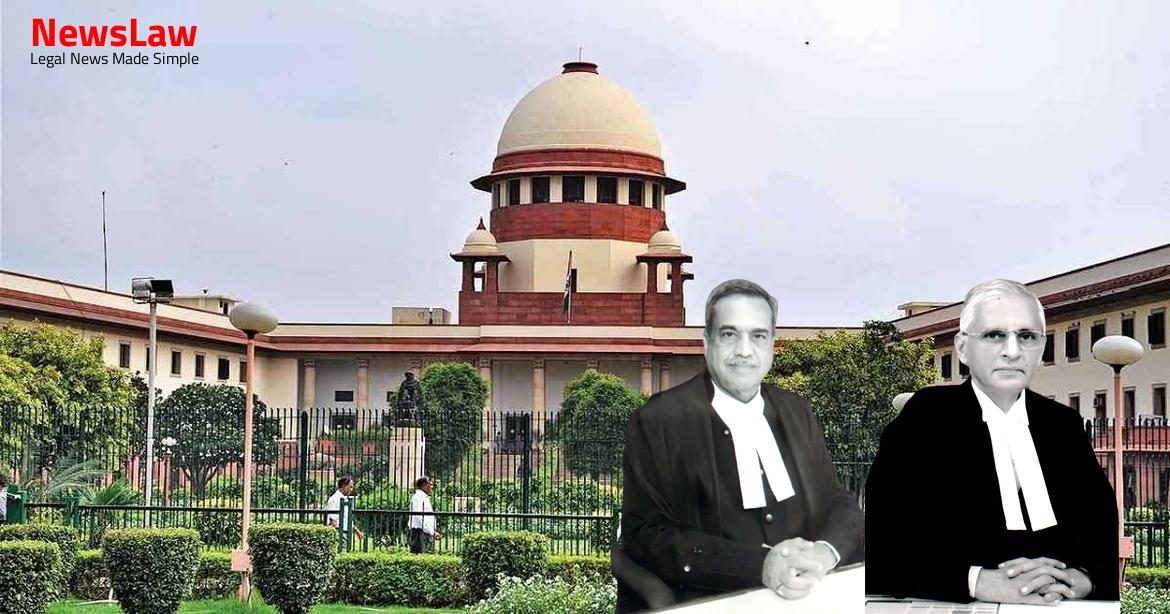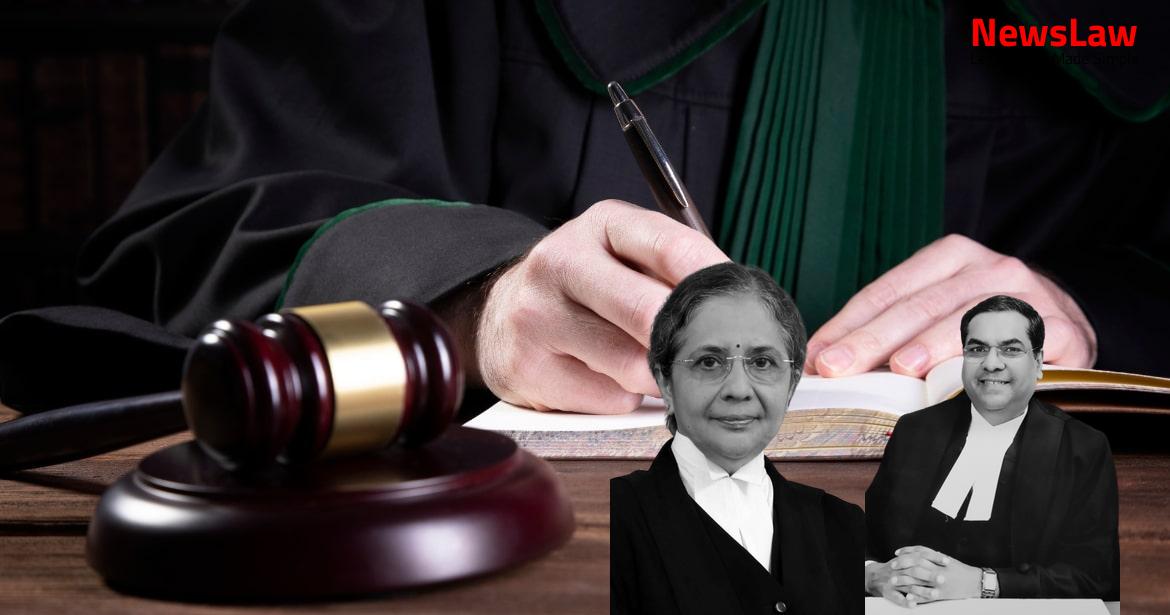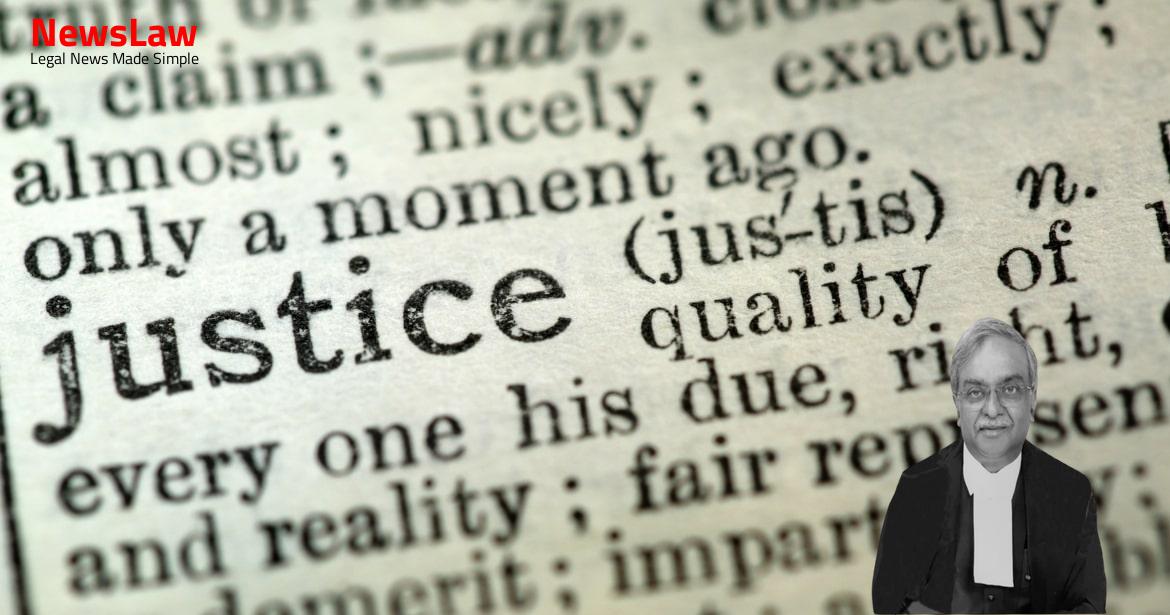Delve into the detailed legal analysis conducted by the court regarding the grant of anticipatory bail in a case related to a business transaction. The focus remains on the interpretation of Section 438 of the Cr.PC and the evaluation of the seriousness of the offenses alleged. Find out more about the court’s considerations in this insightful examination of legal principles.
Facts
- Accused filed for anticipatory bail which was rejected by Trial Court.
- Despite being absconding and facing proceedings under section 82/83 Cr.PC, accused approached High Court for anticipatory bail.
- High Court granted anticipatory bail to accused on the condition of surrender within six weeks and furnishing bail bond.
- Appellant, the original informant/complainant, is aggrieved by the High Court’s decision and has filed the present appeal.
- Appellant argues that High Court erred in granting anticipatory bail to accused based on the circumstances of the case.
- A first information report was filed against accused for various offences under the Indian Penal Code.
- Warrant of arrest was issued by the Chief Judicial Magistrate against the accused.
- Appellant prays for the appeal to be allowed and the High Court’s decision to grant anticipatory bail to be quashed.
- After the issuance of a proclamation under section 82 Cr.PC, respondent No.2 filed an anticipatory bail application before the Trial Court.
- Respondent No.2 is currently absconding and evading the warrant of arrest.
- A proclamation was issued by the Chief Judicial Magistrate against respondent No.2 under section 82 Cr.PC.
Also Read: Legal Analysis on Conviction Based on Sole Testimony of Prosecutrix
Arguments
- High Court granted anticipatory bail to respondent No.2 without considering the nature of allegations in the business transaction.
- Prima facie case found against respondent No.2 for offenses under sections 406 and 420 of IPC.
- Charge sheet filed against respondent No.2 for offenses under sections 406 and 420 of IPC.
- Issues pointed out under Section 82-83 of Cr.PC were ignored by the High Court.
- Seriousness of the alleged offenses under sections 406, 420 of IPC not considered by the High Court.
- Accused respondent No.2 avoided arrest and did not cooperate with the investigating agency.
- Proceedings under sections 82-83 of Cr.PC initiated after arrest warrants were issued.
- High Court should not have allowed the anticipatory bail application considering the conduct of the accused.
- Merely because the cheque was dishonored, it does not automatically constitute offenses under sections 406 and 420 of IPC.
- At this stage, only the charge-sheet has been filed and the Magistrate has yet to take cognizance.
- Respondent No.2 was available for interrogation and not absconding.
- The case may potentially fall under section 138 of the Negotiable Instruments Act, 1881.
- The High Court did not err in granting anticipatory bail to respondent No.2 as the accusation is related to a business transaction.
Also Read: Legal Analysis on Concurrent Sentences in Drug Trafficking Cases
Analysis
- If a person is declared as an absconder/proclaimed offender under Section 82 of the Cr.PC, they are not entitled to anticipatory bail.
- The High Court error in granting anticipatory bail to the accused despite proceedings under Section 82-83 of the Cr.PC.
- The Supreme Court in the case of State of Madhya Pradesh vs Pradeep Sharma stated that an absconder/proclaimed offender is not eligible for anticipatory bail.
- The Lavesh v. State (NCT of Delhi) case reiterated that anticipatory bail is not granted to absconders or proclaimed offenders.
- When an accused is absconding and declared as a proclaimed offender, anticipatory bail is not applicable.
- The Additional Sessions Judge, Saran, rejected the anticipatory bail application of the petitioner.
- The informant alleged that the petitioner took Rs. 36,00,000 for medicines that were never supplied.
- A case was registered against the petitioner for offenses under sections 406, 420 of IPC and 138 of NI Act.
- Witnesses supported the prosecution’s case, stating the petitioner borrowed money and issued dishonored cheques.
- The High Court granted anticipatory bail to the petitioner despite being absconding and the initiation of legal proceedings.
- An arrest warrant was issued for the petitioner, and proceedings under sections 82-83 of Cr.PC were initiated.
- The prosecution case involved allegations of cheating and dishonored cheques in a business transaction.
- The petitioner was accused of taking money for medicines and failing to deliver them.
- The petitioner’s stockiest business relationship with the informant led to financial transactions and borrowing.
- The court analyzed that the nature of the accusations did not warrant an anticipatory bail under Section 438 of the Code.
- Section 438 of the Code deals with the provision of anticipatory bail.
- The power under Section 438 is to be exercised in exceptional cases where the person may be falsely implicated or there are reasonable grounds to believe the accused is not likely to misuse his liberty.
- The applicant must have ‘reason to believe’ that he may be arrested in a non-bailable offense, and this belief must be founded on reasonable grounds.
- The grounds for the belief must be capable of examination, and vague apprehensions are not sufficient.
- It is up to the High Court or Court of Session to decide if a case has been made out for granting the relief of anticipatory bail.
- In cases of business transactions, offences under the IPC such as sections 406, 420, 467, 468, etc. may be applicable.
- The accused has been charge-sheeted for offences under sections 406 and 420, and a charge-sheet has been filed in the court.
- The High Court’s grant of anticipatory bail based on the nature of the accusation arising from a business transaction is not acceptable.
- The focus should be on the nature of the allegation and accusation, rather than the fact that it arose from a business transaction.
Also Read: Legal Jurisdiction and Award Finality in Arbitration Dispute
Decision
- The present appeal has been allowed in the stated terms.
- The impugned judgment and order granting anticipatory bail to respondent No. 2 is unsustainable and has been quashed and set aside.
- Respondent No. 2 has been granted two weeks’ time to surrender before the Trial Court and can then apply for regular bail.
Case Title: PREM SHANKAR PRASAD Vs. THE STATE OF BIHAR (2021 INSC 658)
Case Number: Crl.A. No.-001209-001209 / 2021



